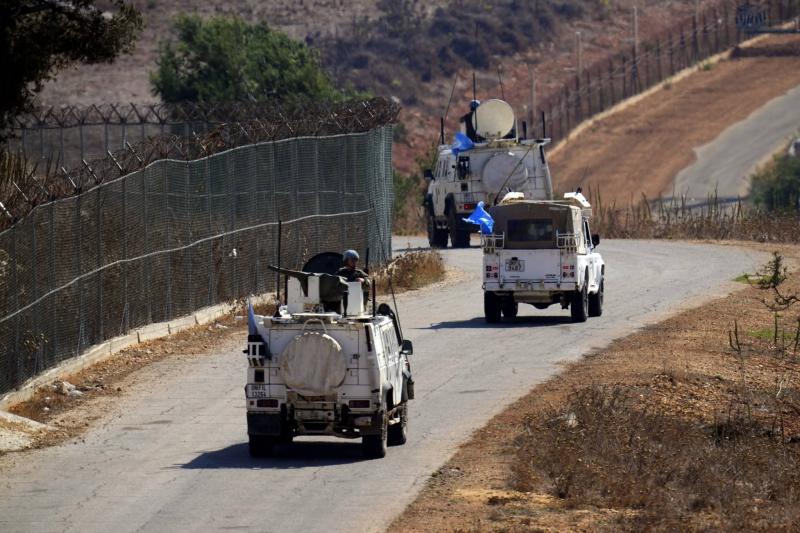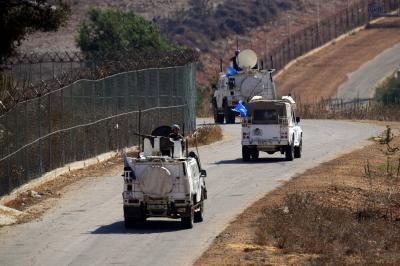Lebanon is reeling from shocking news of the horrific collective massacre committed by Israel in its bombing of the Al-Ahly Baptist Hospital in Gaza, which constitutes a terrifying war crime. At night, calls were issued in all Palestinian camps in Lebanon for mass anger demonstrations in rejection of the atrocity. Caretaker Prime Minister Najib Mikati condemned the bombing that targeted the hospital, stating, "Hundreds of martyrs in the Baptist Hospital in Gaza due to Israeli criminality and the silent global conscience towards injustice and rights. How long must this continue?"
Numerous official, political, and public denouncements poured in regarding the massacre, which occurred on the eve of U.S. President Joe Biden's visit to Israel and Jordan. The situation on the southern border recorded what may be considered the second most violent day since the recent "rocket Sunday," with direct confrontations intensifying yesterday between Hezbollah and Israeli forces. Notably, the exchange of rocket attacks and artillery shelling evolved into continuous confrontations that persisted throughout the day. In the evening, the number of Israeli military sites and targets attacked by Hezbollah exceeded dozens, as acknowledged by Israel, which noted an increase in Hezbollah's activities and threatened to return Lebanon to the Stone Age.
With the increasing signs of field escalation, it became clear that the Lebanese government, through Prime Minister Najib Mikati and Foreign Minister Abdullah Bou Habib, is conducting a proactive diplomatic campaign manifested in ongoing meetings at the Grand Serail and the Foreign Ministry, reflecting rising concerns over possible field confrontations alongside the flood of warnings received by Lebanese officials and Hezbollah regarding the repercussions of involving Lebanon in the ongoing war between Israel and Palestinian factions in Gaza.
Lebanon is closely watching the outcome of the exceptional diplomatic movements that will unfold in Israel and Jordan today with President Biden's visit and meetings in Israel, followed by his participation in a quadripartite summit in Amman, particularly with regard to whether these will lead to measures to restrict the war and prevent its expansion into Lebanon. However, the military developments on the Lebanese-Israeli border indicated a notable escalation and high tension ahead of President Biden's arrival in the region. The southern front saw an increase in hostilities from early morning, highlighted by Hezbollah targeting a tent of Israeli forces containing soldiers in the Ramim settlement opposite the town of Markaba. Israeli forces retaliated with shelling on the outskirts of the towns of Rmeish and Yaroun. The Israeli army announced that an anti-tank missile was fired at one of its positions on the Lebanese border, and the Israeli artillery responded by targeting the firing areas.
Israeli sources confirmed that several Israeli soldiers were killed and injured following the targeting of a military tank by a guided missile on the Lebanon-Israel border before Israeli media announced the launch of a second anti-tank missile. It was also reported that Hezbollah targeted spying and surveillance devices at the Jlal Dir site in the central sector. Later, the party claimed responsibility for attacking Israeli military vehicles, announcing targeting locations such as Zar'it, Sada'a, Jlal Dir, and Malaki with direct weaponry. Israeli artillery shelled the road between the towns of Kfar Kila and Adaisseh. Israel announced the killing of four militants who attempted to cross the border strip to plant a bomb in the Hanjita settlement. In this context, the Lebanese Red Cross announced that four teams headed to the Houleh area to transport the bodies of four martyrs due to the Israeli shelling, reportedly belonging to the infiltrators. Hezbollah mourned five of its fighters yesterday.
In light of this escalation, Israeli National Security Council head Tzachi Hanegbi emphasized that "Israel will respond to any military operation launched from the northern region." He threatened, stating, "We will return Lebanon to the Stone Age if attacked by Hezbollah," indicating that "if our enemies intervene due to the war on Gaza, the United States will intervene."
Amidst this intensification, Prime Minister Najib Mikati chaired a meeting of the National Disaster and Crisis Management Authority at the Grand Serail, during which he clarified, "The range of external and internal communications we have conducted revealed a keen interest in Lebanon and its stability, distancing it as much as possible from the fires igniting around it." He stated, "We continue our communications to restore stability to the south, and the priority in this context is the necessity of a united Lebanese stance regarding the Palestinian issue. This is what we have sensed during this ordeal, and we hope to maintain it among all leaderships. Lebanese unity is essential to surpass this difficult phase and strengthen the Lebanese position on developments."
The Ministry of Foreign Affairs announced that "as part of the proactive diplomatic campaign aimed at preventing escalation and averting the deterioration of conditions in the region, in open consultation with the Prime Minister," Foreign Minister Abdullah Bou Habib held a series of meetings, meeting consecutively with the ambassadors of 26 countries to discuss the latest developments in Gaza and the south. Bou Habib stressed, "We in Lebanon are not war enthusiasts or promoters; rather, we seek to maintain calm and stability. Therefore, provocations and escalating Israeli assaults on the southern border must cease, including the deliberate killing of journalists, targeting civilians and the Lebanese army and its hubs, UNIFIL locations, and shelling populated villages and towns." He emphasized "the need to put an end to the ongoing escalation in Gaza, which has persisted for eleven days, as it may lead to severe consequences for the peoples and nations in the region and for international interests."
Following the visit of French Foreign Minister Catherine Colonna, Beirut welcomed Turkish Foreign Minister Hakan Fidan, who announced that his country "is working to prevent the war from spreading to Lebanon and other countries and that it stands in solidarity with the Egyptian position regarding what is happening in Gaza." He called on the international community "to take a step towards establishing a Palestinian state with Jerusalem as its capital on the 1967 borders." He mentioned that the foreign ministers of the member states of the Organization of Islamic Cooperation are meeting today in Jeddah.
In the internal political scene, opposition lawmakers issued a statement expressing their total solidarity with the Palestinian people and their rejection of dragging Lebanon into a war or turning it into a battleground. They declared from the parliament, "Lebanon, through its army and military forces, has the constitutional right to defend every inch and every citizen on Lebanese soil when attacked. However, we utterly reject dragging Lebanon into a war that will be extremely costly for Lebanon, which has dearly paid, and continues to pay, for the Palestinian cause. It refuses to be fuel in the fire of another state's interests, which seeks to gain at the cost of our children’s blood and the destruction of our country. They, and their allies in Lebanon, were the reason for the complete collapse that has afflicted us."
They continued: "As deputies in the Lebanese parliament, representatives of the people and the nation, we come to say no, no to war, no to dragging Lebanon into ruin, no to anyone ruling over Lebanon’s sovereignty and decision on war and peace, no to involving us in unknown adventures that hold no interest for Lebanon. Our homeland has paid dearly recently and in the distant past due to regional conflicts, leading to the disintegration of its institutions and the collapse of its pillars, with a large part of its people emigrating."
A parliamentary session was held during which the members of the Bureau of the Council and heads of parliamentary committees were re-elected. A number of opposition deputies called for discussing developments in the south and issuing recommendations regarding it; however, President Nabih Berri rejected this and announced his readiness to hold a special session on the matter. Later, during a meeting of the heads of parliamentary committees and reporters, Berri asked, "In light of what is happening in the region and the escalation of Israeli aggression on Palestine, Gaza, and Lebanon, are we presented with an opportunity to elect a president of the republic? Shall we seize it?"
In the evening, President Mikati met with former MP Walid Jumblatt and the head of the Progressive Socialist Party, Taymour Jumblatt, along with MP Wael Abou Faour. Jumblatt remarked afterwards, "The Prime Minister is working hard in his own way, as we are, to try to spare Lebanon from war through his Arab and international communications. We are, in our own humble way, working in the same spirit, but there is no doubt that the Prime Minister's efforts are tremendous, hoping that they will bear fruit and also repair the internal front, as some people seem to be in a different valley." He added, "We hoped, for instance, that this circumstance would lead to a president for the republic and elections for committees without boycotts, etc. It seems that some people are in another world. We will remain alongside the Prime Minister in all efforts he undertakes, hoping not to be dragged into war."




